Director Oliver Stone’s films include Platoon, Born on the Fourth of July, Wall Street, The Doors, and JFK. His latest movie, Heaven and Earth, is based on two autobiographical books by Le Ly Hayslip, a Vietnamese Buddhist who survived rape, torture, and the desecration of her village by the French and by the Americans. After marrying an American military adviser, she came to the United States and now lives in California. Heaven and Earth is the third of Stone’s films dealing with the Vietnam War, but the first one in which Buddhism plays a dominant role. Oliver Stone was born in New York City in 1946. In 1965 he left Yale University for six months to teach English at an institute for ethnic Chinese in South Vietnam. After a stint in the Merchant Marine, he returned to Yale, where he spent so much time working on a novel that he flunked his coursework. In 1967, he enlisted in the army and returned to Vietnam. Following his discharge (with honors), he studied film at New York University. This interview took place this past January at Ixtlan, Stone’s production company in Santa Monica, California, and was conducted by editor Helen Tworkov.
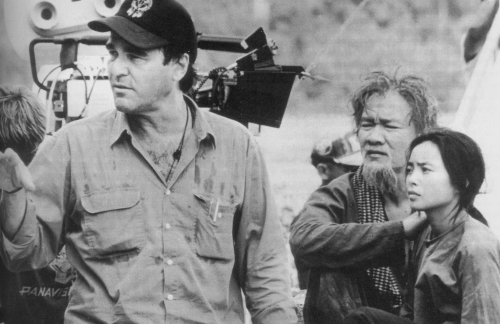
Tricycle: Heaven and Earth is the first American movie that overtly deals with Buddhism. There’s virtually no precedent.
Stone: I can’t think of a major one.
Tricycle: I’m interested in the cultural implications of that.
Stone: So am I. When we entered into this arena, we knew that we were getting into a Buddhist movie. That was clear from Le Ly Hayslip’s books, Child of War, Woman of Peace and When Heaven and Earth Change Places. She was Buddhist, she was devout, and she grew in her Buddhism as she got older.
Tricycle: And the movie follows her view of Buddhism pretty faithfully?
Stone: Yes, though there’s a scene in the movie which originally had a dialogue that I regret leaving out. The seven-year-old girl is praying with her father at the altar, and in the actual dialogue she says to him, “Why can’t you teach me what Buddha is, Papa?” And he says to her, “There is no point in teaching what you are not ready to know.”
Tricycle: In your two previous movies about Vietnam (Platoon and Born on the Fourth of July) there is no Buddhism at all. Buddhism is just now breaking into American culture in all kinds of ways, and it seems more than a coincidence that in 1994, in your third movie about the war, Vietnam has a Buddhist dimension for the first time.
Stone: Your theory is that Buddhism is the shadow of the American involvement?
Tricycle: I’ve never thought of it in those terms, though I’ve thought a lot about the fact that while this country was bombing the hell out of a Buddhist country, many sons and daughters of the establishment were exploring Buddhism as an alternative to their culture and religion. What is your personal history with regard to this? Even though there is a complete absence of Buddhism in the earlier films, you must have been exposed to it the first time you went to Vietnam.
Stone: Yes. And before that. The monks burned themselves in ’63. That’s the key event in this whole story and it only becomes stronger in hindsight, because at the time it was part of the violence of that era and people dismissed it as mysticism, as fanaticism, as a kind of madness that pervaded the time. But in hindsight, it was a key political protest that was going on. To this day the Vietnamese are in the shadow of the new government, and some of the most venerable Buddhists in Vietnam are in jail. They’re political prisoners.
Tricycle: It’s the same all over Asia. Look at Thailand, Burma. What was your own experience?
Stone: My first pass at Platoon had scenes from what they call “the street without joy” in Vietnam. There were a lot of temples and churches. We patrolled that area, and I remember the sense of ghosts being in the landscape. I sometimes felt that we were the ghosts.
Tricycle: This is when you were in the infantry?
Stone: Yes. In the rural areas we went to these terribly interesting, exciting, dusty, broken-down temples, and we’d sit in them and eat lunch, you know, C-rations and stuff. And I didn’t realize that we were defiling the landscape. We would walk through the villages and smash the shrines— smash them—and we didn’t know what that meant. We didn’t understand the power of ancestor worship. We didn’t understand the relationship of the people to their land at all. We also killed people—which is serious business too—for nothing. I remember one time a woman was walking on the road, an old woman, and a guy called to her and she didn’t hear him very well, and he just shot her right then and there because she didn’t obey him. He was pissed off. And we were pissed off because we were losing guys to booby traps and we knew that they were against us but we didn’t know why. That’s what we didn’t understand. We just knew that they did not like us. Our big mistake was cutting the people off from the land and putting them in strategic hamlets. They took 75 percent of the peasantry and relocated them behind barbed wire. And when they removed them from their ancestors and from the cemeteries that housed their dead, from the land where they grew up, that’s when we lost the war. Before anybody even died, we lost it.
Tricycle: Why did you choose Vietnam to run off when you dropped out of Yale to teach English? Why Vietnam in ’65?
Stone: Destiny. It wasn’t consciously sought. There was a lot of newspaper press at the time building up the war drums in Vietnam, so it was very exciting. And I was looking to get out of college. I didn’t believe in the product they were churning out. I didn’t know what was right. I just knew what was wrong. I had to destroy this life pattern. I tried to get to the Belgian Congo as a mercenary, and I investigated Africa.
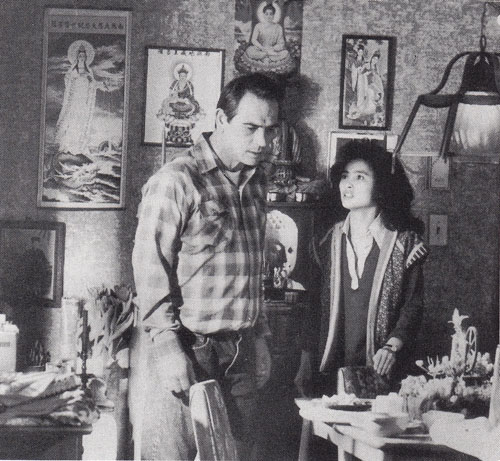
Tricycle: You were interested in fighting even before you got a job teaching English?
Stone: Yes. I was interested in war from my books and my mind. And I tried to get work abroad. I learned of the Free Pacific Institute, which had a position in Cholon. My father got me there. He thought it would just be a summer thing and I’d get it out of my system. I got there in June ’65— the night the My Canh restaurant got blown up and 120 people were killed. The First Infantry was everywhere. It was like Dodge City. Everybody had guns. I went into the Merchant Marine and went to Laos and Cambodia and Phnom Penh and Angkor Wat. Angkor was very important. I saw the power of the spirit.
Tricycle: And then?
Stone: I went back to the States, and I went back to Yale thinking that I could cut it, but I could never get back into the system. I just didn’t like it, and I flunked out. I had written a novel and it had failed and I just went back into the infantry.
Tricycle: So why was there no Buddhist presence in Platoon, for example? If people only knew Vietnam from the way it’s presented in your earlier movies, they wouldn’t know that it was a Buddhist country.
Stone: I don’t think I was curious about their belief system. As an enemy they were indomitable, willing to suffer huge casualties for their independence. One had to wonder what motivated them to die, and I think that’s where [General William] Westmoreland came up with that crazy line. He said, “They don’t value life the same way we do because they always have more lives.” In other words, they don’t care. I think we knew that it was some sort of mystical religion, but you have to realize that coming from the infantry, coming out of that mind-set, coming out of that time—there was such a heavy burden that we had to deal with as Americans that I couldn’t get past being American. Until I got past that, I couldn’t begin to understand what the Vietnamese had gone through.
Tricycle: When you came back from Vietnam and were in New York working in the late sixties, early seventies, were you aware of the growing interest in Buddhism in the mainstream at that time?
Stone: Yeah, sure. I was in the East Village in this shabby little apartment, and there were all sorts of Buddhist symbols everywhere. I had mandalas.
Tricycle: And you never tried to put that together with our destruction of a Buddhist country?
Stone: Yes, I did in my first version of a Platoon screenplay story, called Break, in 1969. I had strong scenes of an animist tribe fighting the U.S. Infantry. The protagonist—the Charlie Sheen character—joined them and fought against his former comrades.
Tricycle: When you talk about having made Heaven and Earth as a Buddhist movie, what does that mean to you?
Stone: How do you shoot the Buddha? That was a tough one. We shot him very gold and burnished. The Buddha image is interspliced throughout the whole film. I thought the key was not to do it too much—just minimally—but it was important to show that it was in her consciousness. I feel it is a Buddhist film. It’s circular. The first image is of Le Ly going into the temple as a child and the last image is of her coming out of the temple a thirty-eight-year-old woman. Which is sort of what I did with Vietnam, in terms of going through the American experience, but also trying to go backinto the Vietnamese experience and complete this circle. I feel instinctively that there is a completion here.
Tricycle: You’ve now become the vehicle for more people seeing a Buddha image than anything that has ever been done with film in the West.
Stone: Well, the film is not commercially successful yet, and I don’t think it will be in this country. People are frightened and still have a guilt complex about Vietnam. There is a viewer resistance to this film. Our best markets have been Asian-Americans and cities, sophisticated audiences, upscale audiences; and we’re doing better west of Denver.
Tricycle: Do you think the resistance is to Buddhism, to a woman, or to a Vietnamese woman?
Stone: To an unknown Asian, but more toward Vietnam. But if the same movie had Julia Roberts playing Le Ly, we would be doing much better.
Tricycle: And does that involve issues of racism or multiculturalism?
Stone: Ethnocentricity, let’s say. Racism, possibly. Some people have suggested that because of economic hard times there is resentment against Japan and Korea, and all Asians are lumped into one. And maybe the concept of Buddhism, the concept of surrender to adversity threatens the tendency in Judeo-Christians to fight, to die, to struggle, to resurrect. The concepts are a little bloodier, a little more gladiatorial. We have a Super Bowl culture, and America wants fighters. And Le Ly doesn’t really ever get that angry. One critic was saying, “She’s too passive,” but it’s not true.
Tricycle: She wasn’t passive. She was so strong and tough. The American husband felt that he had married this submissive Asian woman, and she turned the tables.
Stone: That’s correct. And she was doing well in America and he wasn’t.
Tricycle: What is your own hope for Buddhism in this country?
Stone: I hope, personally, that America finds it. Because Buddhism can only be good for this country—for the political, social, and cultural ethic. It has a beneficent, self-realization energy that can only help America heal. In a time when our country is wracked with crime and violence, what is interesting about the movie is that here is a woman who goes through devastating violence, and she does not hate anyone. She forgives the men who have hurt her and raped her and tortured her. She has no enemy. So I think the message in the movie for Buddhism per se is valid for America: not to create a crimescape of good and evil characters, of dualities, that we must see into the heart of crime and understand and deal with the problems, or that violence is going to repeat itself over and over again. When you’re in Asia the volume is lower, people talk in a much more gentle way. Television itself is at a lower volume. When you hear CNN in Asia you notice the difference right away; you flip the channel and the noise level goes up.
Competition—the emphasis is always on competition. That is what I notice most about America. Competition as money, competition to kill the opponent, whether it be a football team, or a commercial, or black-and-white heroes on television. I think that America would have to tone down the volume, the ethic, which is essentially competitive, that makes for the free-market domination. So, in a sense, money is, the function of the will to power. But if we can enjoy the dance and make money and be a little detached from it, that’s okay. You don’t have to blowout your competition to be the best, or to be good. The emphasis in America is being number one as opposed to just being good. Asia is becoming more consumerist, and hopefully America may become a little more Eastern. Maybe the twenty-first century will be a spiritual century after all. But I’m a little disheartened. In writing about the movie, none of the critics caught the Buddhism.
Tricycle: Do you do any kind of Buddhist practice?
Stone: Let’s put it this way: I came under the influence of Le Ly. I understood the practical aspect of her belief on a daily basis. Here is a woman who is devout, who goes and prays in front of ancestors and shrines, who puts oranges and apples in front of shrines and truly believes in the spirit world. As you see her on a daily basis, you begin to understand that Buddhism has a function in village life too. I went to see her mother and her sisters. I lived in the village in Vietnam and we built one in Thailand. Of course, in Thailand, right next to the location, monks are walking on the sides of the road, and every dawn, on the way to the location at 5:30 in the morning, you see monks with their begging bowls and people putting food in the bowls. This is most definitely not mysticism; this is just daily life. There must be 120,000 monks in that country. It’s enormous. The acceptance of so many men not working is incredible.
Tricycle: Not working?
Stone: Not working in the conventional, economic sense. It’s amazing. And these are young, proud men. You see kids that are fourteen and fifteen years old who are already into it, they have already shaved their heads and are apprentices. So it’s a working aspect of life there, which is practical. It’s not a Sunday religion, a concept which attracted me. I used to go to church on Sunday, but the truth is that you’re better off dealing with your spiritual side every day and recognizing that each day is a wrestling match, each day is a “Why am I alive?” day. Meditation offers that.
Tricycle: Have you actually been meditating?
Stone: Yes.
Tricycle: According to a certain Southeast Asian tradition?
Stone: Breathing, Vietnamese.
Tricycle: So you do a kind of breathing meditation with no particular allegiance to a particular sect or teacher?
Stone: I’m going down the road and trying not to get locked into organization. To me, organized religion is for people who are afraid of hell. Spirituality is for people who’ve already been to hell. A lot of people have been after me to chant or this or that. I was very impressed with the rinpoches that I met in Nepal. I realized that they were highly intelligent, evolved. I have also been very admiring of the Vietnamese Buddhists that Le Ly introduced me to, and in Thailand the Thai monks came to the set. When I was in Thailand, this incredible thing happened. There was a military coup. It was awful. And then, while we were there, 120,000 monks chanted on the same day at the same moment. They organized it. They chanted protests. That song—I mean, can you imagine 120,000 monks chanting all over the country? And a week or two later the government collapsed. The military government gave the power back. There was a sense of conscience, of guilt. There was a feeling in the air that something had been done that was so wrong. Every Thai I talked to had a deeply inherent moral repugnance toward killing, and the killing of those students on that day. And those monks were upset, but the Thai people don’t say things; it’s gentle. The protest was a gentle protest, in the tradition of Martin Luther King or Gandhi, and it worked. It was really powerful.
Tricycle: When you present Buddhism in Heaven and Earth, you do it through Le Ly’s story, and you talked earlier about how gentle she is and the gentleness and compassion of Buddhism and the possibilities that it offers this country. Yet at the end of the movie, when she returns to visit Vietnam, her brother is angry at her, and at what he experiences as her betrayal of him and of Vietnam, and he is a Buddhist too. And the village boys who raped her and the southern Vietnamese who tortured her were also Buddhist, and the military junta in Thailand was Buddhist. How do you put all that together?
Stone: Well, there are some Buddhists who are more Buddhist than others. Ignorance is universal. Everyone is not enlightened to the same degree. I mean, maybe not all Vietnamese are Buddhists, they may have just been peasant farmers without much respect for shrines either. Some of these boys did not grow up with good families either. The two boys that did rape her I think had a thing for her way back. They considered her a snotty rich kid because her father was doing well. And you know, inside the turmoil of war is lust.
Tricycle: In Heaven and Earth Le Ly embodies Vietnam—in some ways—and Tommy Lee Jones embodies America. He’s this big, patriarchal white guy who’s going to rescue this little gentle Asian woman. He brings her back and basically betrays her again. And where Buddhism becomes the strongest in the movie is in her capacity for forgiveness, her capacity for compassion, which is clearly linked to her Buddhist heritage as you present it. She creates for this man a whole new possibility through forgiveness. And what he does with that new possibility is blow his brains out. He can’t handle it. I wonder if that could be extended to the culture at large. Would this country commit suicide if it had the opportunity for forgiveness, especially in relationship to Vietnam?
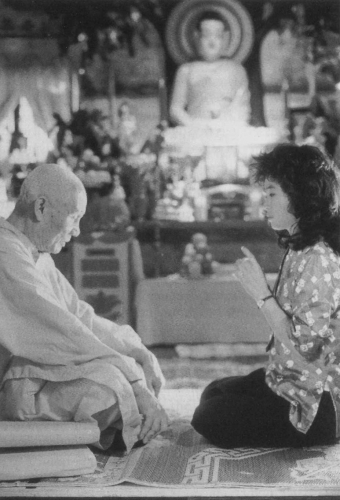
Stone: I felt that he always knows she is a good person, he knows that she has found a path of openness, of life. He knows that conversely, he is on the path of death. And he almost feels that the only way out is to start over in another life. And that’s why I have that scene with the wizard, right after he kills himself, and that’s why he dies naked. In the Tibetan Book of the Dead there’s a feeling that one goes into the new world conscious, conscious by being naked—that’s why he did it that way. Then, in the next scene the wizard signifies to Le Ly that he is trying to get into the temple. I love the moment she looks out at the wizard and asks, “Are you sure? Stevie was such a good Christian!”
But I don’t think the country would imitate Tommy Lee Jones, because you have to remember, he plays a man who has killed a lot and he has a lot of guilt. Most Americans feel guilty about Vietnam, but it’s not like the first-generation guilt he had. It is more like removed guilt. It’s easier to forget. We do everything indirectly. We don’t have to press the buttons that kill. We use a credit card and the credit-card system, and we support the system with killings. We are all buying into the military industrial complex with our taxes, and we let other people do the killing. McDonald’s kills the cows for us. We don’t get our hands dirty.
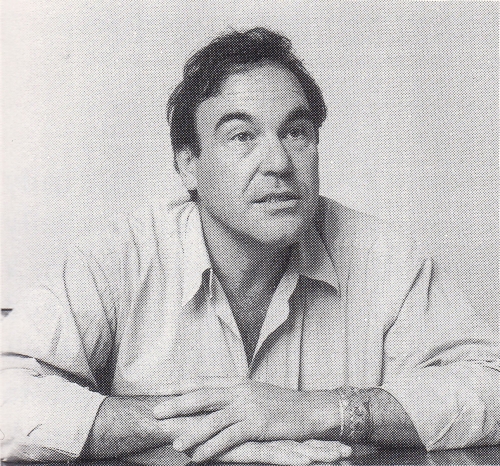
Tricycle: Not even in Vietnam?
Stone: Some people did. A lot of people walked away from it.
Stone gets up from the sofa, walks to the wall behind his desk, and removes a framed certificate indicating that he has received the five lay precepts from a Buddhist priest. The Buddhist name given to him is Minh Duc.
Tricycle: What does it mean, Minh Duc?
Stone: Virtue and brilliance, I think. His call.
Tricycle: I saw the film in New York and I went again last night here in Los Angeles. When Steve [Tommy Lee Jones] says to Le Ly, “I have learned a lesson from my first wife—I need a good Oriental woman,” the audience in L.A. started laughing. Why? In New York this line drew no noticeable response.
Stone: I don’t know why. I’ve heard that before. On the surface it’s because this man has a locked mind-set. It doesn’t matter who she is, you know, she could be a mail-order bride.
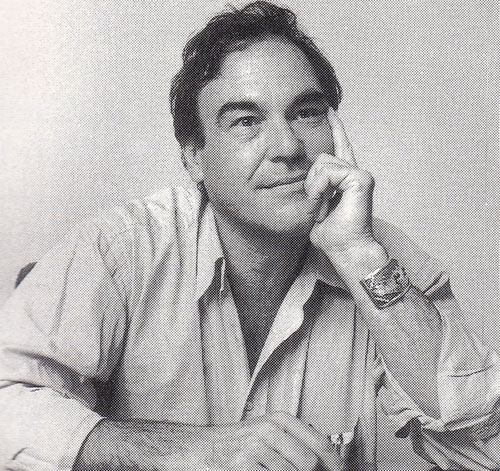
Tricycle: In the film you ally femininity with Buddhism. Buddhism becomes a very feminine expression, wholly embodied by a woman.
Stone: Yes. Steve’s world is one of suffering, much suffering. There is no relief from the suffering. Her world, although it has suffering in it, is just maya. So she’s able to create the dance, to go through suffering and get through it because of her ability to change. She moves on. She’s flexible. She is water, understanding. He is locked into rigidity. He is rock. Because feminine energy is flowing energy, it’s more receptive, surrendering. Masculine energy tends to be a little more defining and aggressive. Position-taking, territory-taking. Masculine energy tends to be toward the ego. It seems that female energy is less territory-minded. Because of all that happens to her, she has to give up everything. There is no territory she has, right? Ultimately her body is raped and plundered too. In America, actually she gets ahold of some territory and she becomes the most masculine in America, because that’s where she gets into capitalism.
Tricycle: It’s interesting the way a culture—and by extension its religion—can be gendered. For example, look at the American view of Asia: mail-order brides are disproportionatHell First, Then Heaven and Earthely Asian, sex ads on TV disproportionately feature Asian women, and most of the Caucasian/Asian intermarriages are between white males and female Asians. So there is a kind of Orientalist view that feminizes the East. And there are many ways in which Heaven and Earth extends this view. Yet the turmoil that is all over Asia today presents a much more complicated picture of Buddhism than a gentle “feminine” version. Is your version helpful to emerging Buddhism in this country? How do you think we can avoid those same pitfalls?
Stone: Get to be a Buddhist first, then worry about it. [Laughs.] Actually, I don’t think it’s about what religion you are or what path—it’s about self-realization. We have to repeat images and sounds and poetry that harken to the life-force, that are honest. When we are inundated with false images, false idols, this hurts us. Obviously I was thinking of the nature of our system—advertising—the nature of blood. . . . I make violent imagery, as you know. It’s a warrior’s path. You should see my next film, The Natural Born Killers, it’s pretty rough. But it has a point, too. It shows, without any commentary, the landscape and crimescape. Young people will understand it, but older people will be horrified by it.
Tricycle: One of the things that is hard to figure with your films is that you’re always trying to exorcise Vietnam but there is also a very erotic attraction to violence—and it’s all going on at the same time.
Stone: Yes, I feel that is very much true of life. Life experience, and I can only speak for myself, is contradictory. I don’t understand half the contradictions I live through. I do sometimes, in hindsight, and I know that I am more aware than I ever was, because on my path I have been exposed to people who have taught me a lot. I went to a meditation with a Sanskrit scholar. In two meditations I had very startling images of Christ that kept reoccurring. I don’t know if it’s because of my own iconography as a kid—and I never thought I was appreciative of Christ, ever—but I went to these meditations and Christ kept appearing. So obviously Jesus is still part of my life, my iconography. I believe Jesus and Buddha can exist together.
Tricycle: In terms you were using earlier about Buddhism—turning down the volume—is Buddhism at all threatening to you? Your volume is pretty high.
Stone: This is the gentlest movie I have done.
Tricycle: But aside from that, are there aspects of Buddhism that are threatening to you in terms of what they may demand of you?
Stone: Sure.
Tricycle: Such as?
Stone: The ultimate withdrawal from the world is frightening to me. I am an imagist and what I do is make murals, and I hope that I can continue to do so. I think you can be an artist in the service of a philosophy or of a religion. A lot of the great frescoes were created for religious reasons, spiritual reasons. There is no reason why you can’t be a Buddhist filmmaker and still function in Western society—as long as you don’t make the mistake of being fraudulent and corrupt and paying homage to dualities that don’t exist. I would not make the kind of movies that I did when I was younger, where I put the blame and responsibility on someone external. That victimization does not work for me anymore.
Thank you for subscribing to Tricycle! As a nonprofit, we depend on readers like you to keep Buddhist teachings and practices widely available.